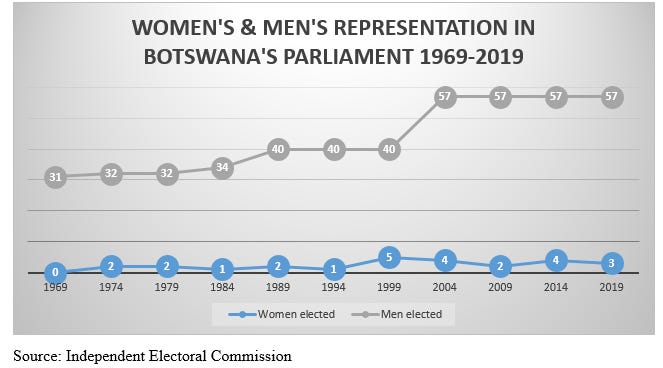Analysts: Gender Barriers Keep Women Underrepresented in Botswana's Politics
Women's rights groups like Emang Basadi have found Botswana lacks a clear constitutional framework ensuring equal political participation between men and women.
GABORONE, Botswana— Despite Botswana's democratic credentials, women remain significantly underrepresented in the country's political leadership, holding just 5% of parliamentary seats on average over the past six decades, according to an analysis of election data by the Independent Electoral Commission, writes Keneilwe Lephoi.
The stark gender gap endures even as Botswana is praised as a model democracy in Africa. In the 2019 general elections, only three out of 57 elected members of parliament were women.
Women's political participation is considered vital for promoting gender balance and upholding democratic values. However, Botswana ranks a middling 66 out of 146 countries on the U.N.'s Gender Inequality Index, which measures disparities in areas like health, empowerment and economic participation.
A number of analysts attribute women's low representation in Botswana politics to the historically patriarchal structure of the country's male-dominated society and the absence of legislative quotas or other measures to boost gender diversity in decision-making bodies.
"There is inadequate representation of women in policymaking platforms, particularly through political representation," said Daisy Bathusi, secretary for labor with the opposition Botswana Congress Party.
"Cultural norms, socio-economic disparities and institutional biases continue to serve as formidable obstacles, relegating women to the fringes of decision-making processes."
IEC data shows no women won parliamentary seats in the country's first multi-party elections in 1965 and 1969. It was not until 1974 that two women were elected, accounting for just 6% of the 32-member legislative body at the time.
Women's representation rose marginally to 12% in 1999 after five women won seats in the 40-member parliament.
But the figures have stagnated since then, even as the total number of parliamentary seats increased to the current 57.
The BCP is the only political party that has tried to enforce a 30% quota for women candidates, while others have only voluntary gender quotas.
Bathusi said if elected, the BCP would aim for 50% of all legislators at the national and local levels to be women, with a focus on youth representation.
Thilo Schöne, Botswana director for the Friedrich Ebert Foundation, which has helped train women candidates, said a lack of economic opportunities makes it difficult for women to run and fund campaigns in Botswana.
He added that women are not traditionally seen as leaders in Tswana society and often face harassment within male-dominated political parties.
Schöne argued increasing women's representation is not just a matter of training but overcoming systemic barriers.
"It's a zero-sum game. Having more women in parliament means having fewer men, and that can be a threat to those who feel threatened," Schöne said.
"Gender equality...means some men will lose positions if they don't perform."
Both Schöne and Bathusi advocated for civic education, legislated gender quotas, political funding incentives and stronger laws mandating equal representation as ways to overcome obstacles preventing women's entry into Botswana's highest political offices.
Women's rights groups like Emang Basadi have found Botswana lacks a clear constitutional framework ensuring equal political participation between men and women.
They argue the country has also failed to effectively implement policies and commitments promoting gender equality in leadership.



